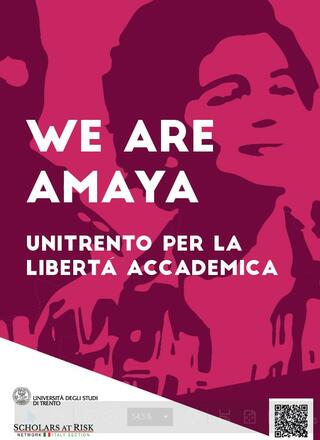
In this report, students outline the structure of the seminar that offered them the possibility to coordinate and experience an advocacy campaign focused on a specific case of violation of academic freedom.
As they state in the introduction, “advocacy actions are indeed vital to raise students' awareness and consequently to inform academic community and civil society”. Through advocacy campaigns, the network SAR Scholars at Risk aims at defending scholars' right to autonomy from political and private interferences, as well as freedom of expression.
The topic
Among the cases submitted to them, students chose the case of Amaya Eva Coppens, a medical student at the National Autonomous University of Nicaragua, who was arrested in September 2018 for having participated in a nationwide protest movement against the government.
Background and organisation
During this phase the students approached - both conceptually and historically - the topic of academic freedom, and after selecting the specific case they started thinking about the advocacy activities they could carry out during the semester. During the first meeting they got in touch via Skype with Adam Braver Roger from Williams University, coordinator of SAR Advocacy Seminars, in order to receive suggestions and inputs.
Research on the case
Almost all sources are available online. In addition to the SAR webpage, participants consulted the webpages of different NGOs that defend human rights, such as Front-Line Defenders and Amnesty International. However, most of the information acquired derives from newspaper articles.
Advocacy activity
The main activities performed were the signature collection for a petition, info points in different university departments, the participation in a social event open to the public, the involvement of the Rector asking him to support the petition, the invitation to journalists, a peer seminar at the University of Padua, the participation in different conferences and events, the production of graphic material in order to carry out a visual advocacy campaign (a leaflet, a poster, and stickers with different QR codes), the webpage hosted by the University of Trento website, the contacts with a Nicaraguan students' association.
The report provides then detailed information about the history and the current situation of Nicaragua, the case of Amaya Eva Coppens and international actions on the case, and describes all advocacy activities performed by the students, listing different feedbacks and reactions by the people approached.
The last pages feature individual feedbacks from participants, a press review, and some recommendations.
Tags: Freedom of expression Media freedom Trust in media ItalyThe content of this article can be used according to the terms of Creative Commons: Attribution-NonCommercial 4.0 International (CC BY-NC 4.0) . To do so use the the wording "this article was originally published on the Resource Centre on Media Freedom in Europe" including a direct active link to the original article page.

